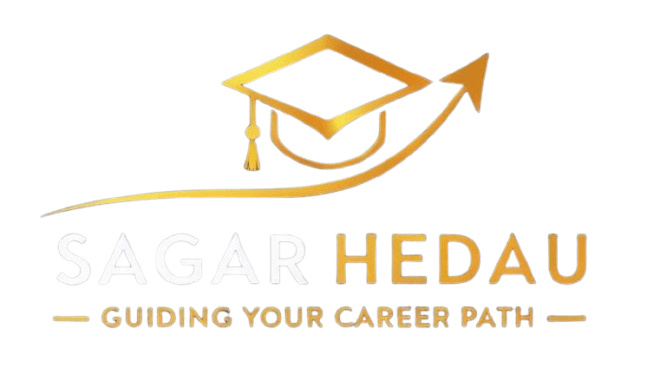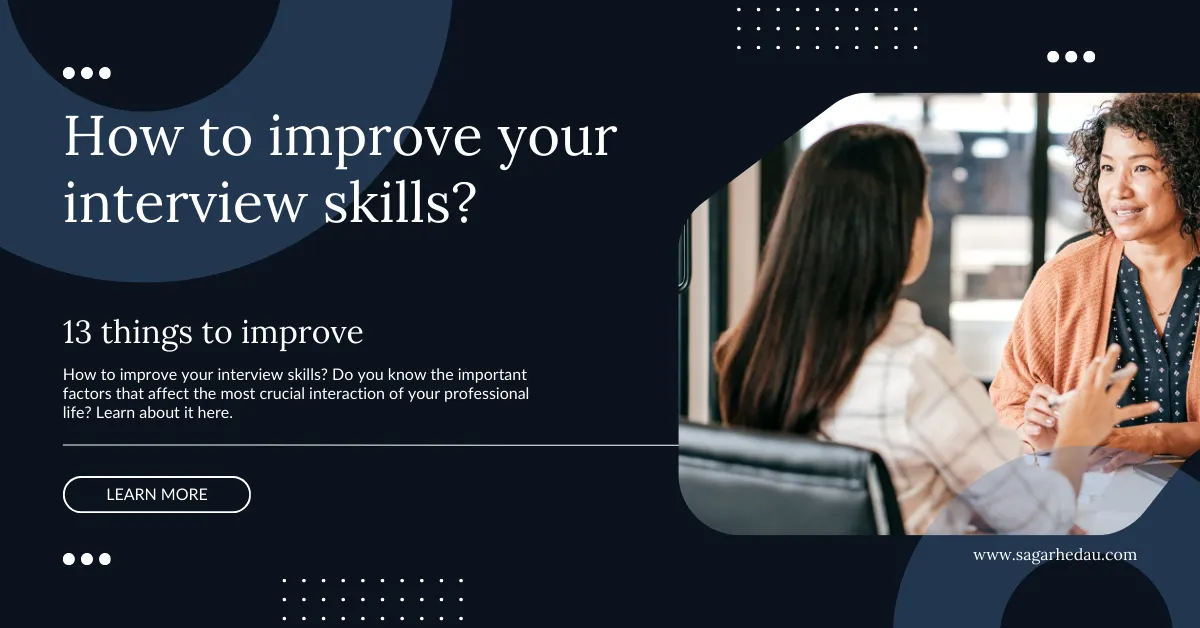Interviews can be nerve-wracking, but they’re also an essential part of landing your dream job. Whether you’re just starting out in your career or looking to make a change, having strong interview skills is crucial. After all, an interview is often the only chance you have to make a lasting impression on a potential employer. In this article “How to improve your interview skills?”, we’ll explore practical tips and strategies to help you improve your interview skills and boost your confidence.
Key Takeaways on “How to improve your interview skills?”
- Preparation is Essential: Research the company and understand the job role thoroughly to align your skills and experiences with what the employer is seeking.
- Practice Common Questions: Familiarize yourself with common interview questions and use techniques like the STAR method to structure your responses effectively.
- Nonverbal Communication Matters: Your body language, eye contact, and posture play a significant role in how you are perceived during an interview.
- Ask Insightful Questions: Prepare thoughtful questions to ask the interviewer, demonstrating your interest in the role and helping you assess if it’s the right fit.
- Mock Interviews Help: Conducting mock interviews can greatly enhance your confidence and performance by simulating the interview environment.
- Manage Stress: Use mindfulness and breathing exercises to calm your nerves and maintain focus during the interview.
- Follow-Up is Important: Sending a thank-you note after the interview shows appreciation and keeps you top of mind with the employer.
- Learn from Experience: Reflect on each interview to identify areas for improvement, helping you perform better in future opportunities.
How to improve your interview skills? Thing to know
Understanding the Basics of a Job Interview
Before diving into specific strategies of “How to improve your interview skills?”, it’s important to understand what a job interview is really about. Essentially, it’s a conversation between you and a potential employer where they assess whether you’re the right fit for the job. They’re looking for someone with the skills, experience, and personality that match their needs.
There are several types of interviews you might encounter, including traditional face-to-face interviews, phone interviews, and increasingly popular video interviews. Each format requires a slightly different approach, but the core principles remain the same: preparation, presentation, and performance.
Researching the Company
One of the biggest mistakes candidates make is walking into an interview without a solid understanding of the company they’re applying to. Researching the company shows that you’re genuinely interested in the position and that you’ve taken the time to understand its mission, values, and challenges.
Start by visiting the company’s website, reading up on their latest news, and checking out their social media profiles. Look for information on their industry, competitors, and key projects. Understanding the company’s culture will also help you tailor your answers to align with their values.
Understanding the Job Role
Just as important as knowing the company is understanding the specific role you’re applying for. Review the job description carefully, highlighting the key skills and experiences required. Think about how your background aligns with these requirements and be prepared to discuss specific examples that demonstrate your suitability for the role.
Tailoring your responses to the job role not only shows that you’re well-prepared but also helps you stand out as a candidate who truly understands what the position entails.
Practicing Common Interview Questions
While every interview is different, there are certain questions that tend to come up time and time again. Common questions include
- Tell me about yourself
- What are your strengths and weaknesses?
- Why do you want to work here?
It’s important to practice your responses to these questions but avoid memorizing them word for word. Instead, focus on structuring your answers in a way that’s clear, concise, and relevant to the job.
Behavioural questions, which ask you to describe past experiences that demonstrate certain skills, are also common. A good way to approach these is by using the STAR method (Situation, Task, Action, Result), which helps you structure your response in a logical and compelling way.
Mastering Nonverbal Communication
Communication isn’t just about what you say—it’s also about how you say it. Nonverbal communication, including body language, eye contact, and hand gestures, plays a huge role in how you’re perceived during an interview.
Maintaining good eye contact shows confidence, while a firm handshake can convey professionalism. Pay attention to your posture as well—sitting up straight with your shoulders back can make you appear more engaged and interested.
Developing Your Personal Elevator Pitch
An elevator pitch is a short, persuasive speech that you can use to spark interest in who you are and what you do. In the context of an interview, your elevator pitch is often your answer to the question, “Tell me about yourself.”
A strong elevator pitch should be concise, compelling, and tailored to the job you’re applying for. It should highlight your key skills and experiences, and explain why you’re passionate about the role.
Preparing Questions to Ask the Interviewer
Interviews are a two-way street. While the interviewer is assessing you, it’s also your opportunity to determine if the company and the role are a good fit for you. That’s why it’s important to prepare a few insightful questions to ask at the end of the interview.
Good questions can demonstrate your interest in the company and the role, and they can help you gather valuable information to make an informed decision if you receive a job offer. Examples include “What does a typical day look like in this role?” and “How do you measure success in this position?”
Dressing for Success
First impressions matter, and your appearance plays a big role in how you’re perceived. Dressing appropriately for the interview not only shows respect for the opportunity but also boosts your confidence.
The right outfit depends on the company culture—some organizations are more formal, while others might have a business-casual dress code. When in doubt, it’s better to be slightly overdressed than underdressed. Make sure your clothes are clean, well-fitting, and professional.
Handling Interview Stress
Feeling nervous before an interview is completely normal, but it’s important to manage that stress so it doesn’t impact your performance. One effective technique is mindfulness, which involves focusing on the present moment rather than worrying about the future.
Breathing exercises can also help calm your nerves. Try taking slow, deep breaths before the interview to help reduce anxiety. Remember, the more prepared you are, the more confident you’ll feel, so take the time to practice and plan ahead.
Mock Interviews: The Power of Practise
Practice makes perfect, and one of the best ways to prepare for an interview is by conducting mock interviews. These can be done with a friend, family member, or career coach. The goal is to simulate the interview environment as closely as possible so you can get comfortable with the process.
After the mock interview, review what went well and where there’s room for improvement. This feedback is invaluable and will help you refine your approach to the real thing.
Understanding Interview Etiquette
Good manners go a long way in an interview. Basic interview etiquette includes being on time, greeting your interviewer with a smile and a firm handshake, and being polite throughout the conversation.
Don’t forget to send a thank-you note after the interview. This small gesture shows appreciation for the opportunity and can help keep you top of your mind as the employer makes their decision.
Improving Listening Skills
Active listening is a crucial skill in interviews. It involves fully concentrating on what the interviewer is saying rather than just waiting for your turn to speak. This allows you to respond thoughtfully and show that you’re engaged in the conversation.
To improve your listening skills, practice focusing on the speaker and summarizing what they’ve said in your own words before responding. This not only ensures you’ve understood correctly but also shows that you’re paying attention.
Learning from Past Interviews
Each interview is a learning experience, whether you get the job or not. After every interview, take some time to reflect on what went well and what could have been better. Consider any feedback you received and think about how you can apply it to future interviews.
Learning from your past experiences will help you continually improve your interview skills, making you more prepared and confident with each opportunity.
Conclusion
Improving your interview skills is a journey that involves preparation, practice, and a willingness to learn from each experience. By understanding the basics, researching the company, practising common questions, and refining your nonverbal communication, you’ll be well on your way to acing your next interview. Remember, confidence comes from preparation, so take the time to prepare thoroughly and believe in your ability to succeed. Keep practising, and you’ll see your skills—and your job prospects—improve significantly.


